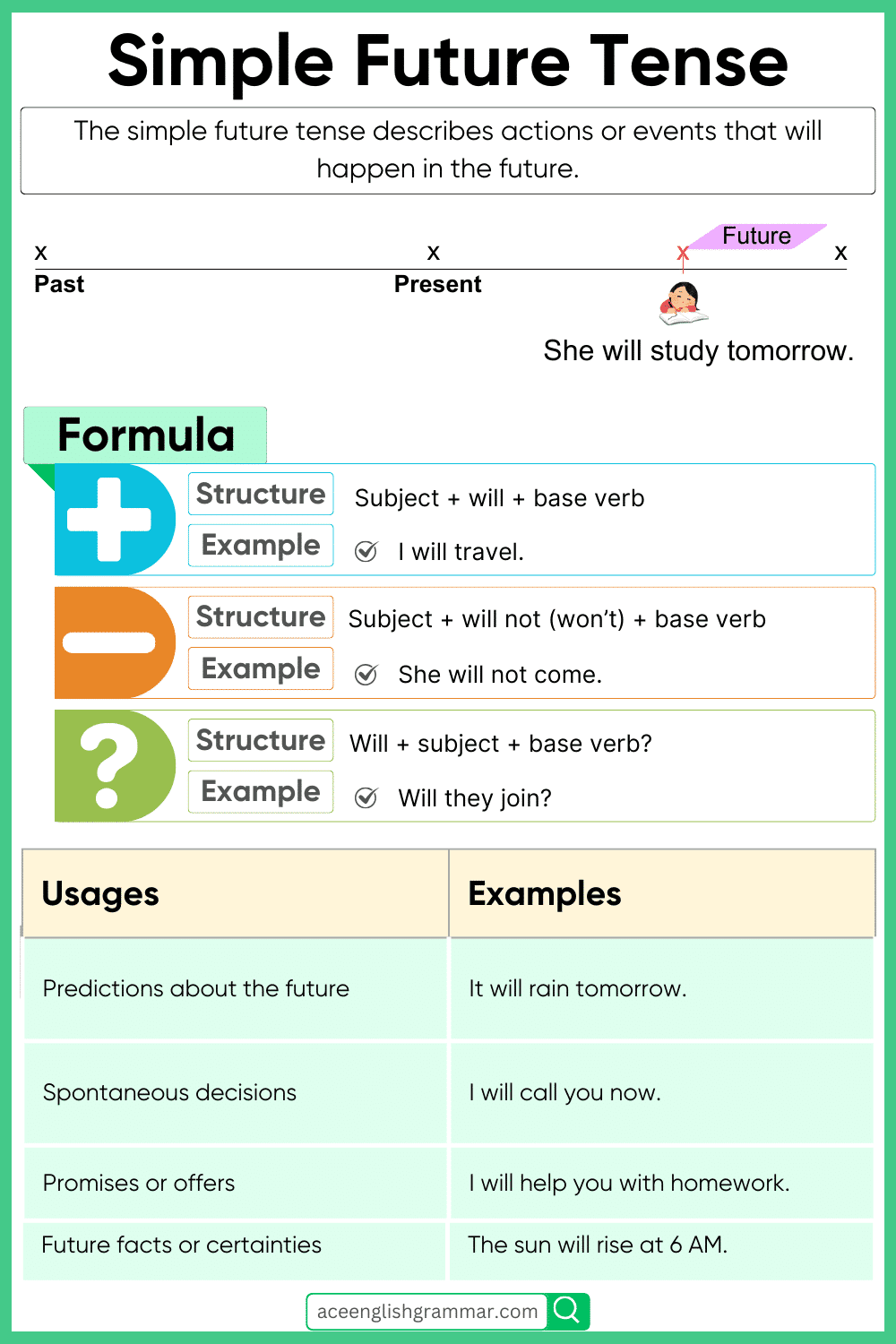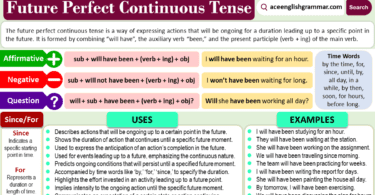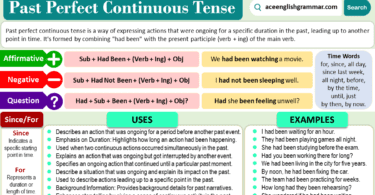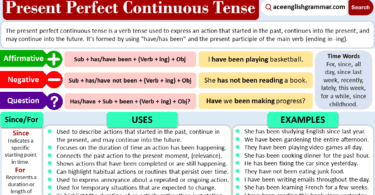The Simple Future Tense, also known as the Future Indefinite Tense, is used to express actions or states that will occur after the present moment. It is essential for talking about future plans, predictions, promises, or assumptions. Forming the simple future is straightforward, relying on the auxiliary verb “will” (or sometimes “shall”) followed by the base form of the verb.
Table of Contents
What is Simple Future Tense?
The Simple Future Tense describes an action that will happen later — tomorrow, next week, or anytime in the future.
- I will travel to Lahore.
- She will write a story.
The tense expresses future actions clearly and doesn’t require a specific time reference, making it flexible for various contexts.
Structure of Simple Future Tense
Positive Form (+)
The basic structure for positive statements is:
- Subject + will/shall + base verb
Example:
- I will study for my exam tomorrow.
- They will visit the museum next week.
Both sentences indicate actions that will occur in the future.
Negative Form (-)
To form negative sentences, insert “not” after “will” or “shall”:
- Subject + will/shall + not + base verb
Example:
- He will not eat fast food.
- They will not attend the meeting.
These forms show that the actions will not happen in the future.
Interrogative Form (?)
For questions, invert the subject and “will”:
- Will/shall + subject + base verb?
For example:
- Will you come to the party?
- Shall we meet at the café?
These structures are used to ask about future actions.
Using “Will” and “Shall”
“Will” is most commonly used with all subjects (I, you, he, she, it, we, they).
- I will call you tomorrow.
- They will finish their work by noon.
“Shall” is less common and typically used with “I” and “we” in more formal or traditional contexts.
- We shall discuss this later.
- Shall we meet at the café?
Time Expressions for Simple Future Tense
The Simple Future is often used with specific time expressions that indicate when the action will take place. These include:
| Time Expression | Example |
|---|---|
| Tomorrow | I will call you tomorrow. |
| Next week | He will travel next week. |
| In an hour | We will arrive in an hour. |
| Soon | She will respond soon. |
| Tonight | I will cook dinner tonight. |
When to Use Simple Future Tense
- Expressing Future Actions
The most common use of the Simple Future Tense is to describe actions or events that will occur at some point in the future.
- She will graduate next year.
- Making Predictions
It is used to predict or assume something about the future.
- It will rain tomorrow.
- Intentions and Plans
The tense expresses future plans or intentions made at the moment of speaking.
- I will start a new project next month.
- Promises and Offers
It is also used for promises or offers made spontaneously.
- I will help you with your homework.
- Asking for Information
Use it to ask about future actions or events.
- Will you attend the meeting tomorrow?
- Expressing Conditions
It can be used in conditional sentences to describe future outcomes.
- If it rains, we will stay indoors.
Rules of Future Indefinite Tense
- Formation:
Use “will” or “shall” + base form of the verb to express future actions.
- He will visit his grandmother tomorrow.
- Negative Form:
To form negatives, place “not” after “will” or “shall”.
- She will not attend the party.
- Interrogative Form:
For questions, invert “will” or “shall” with the subject.
- Will you help me with the project?
- Use with Time Expressions:
Time expressions such as tomorrow, next week, or in the future often accompany the Simple Future Tense to provide clarity about when the action will take place.
- They will visit us next summer.
Simple Future vs Present Simple Tense
| Aspect | Simple Future Tense | Present Simple Tense |
|---|---|---|
| Definition | Describes an action that will happen in the future. | Describes regular, habitual actions or general truths. |
| Structure | Subject + will + base verb | Subject + base verb / verb + s/es |
| Example | Maryam will travel to Dubai next month. ✅ | Maryam travels to school every day. ✅ |
| Time Reference | Future events or decisions | Daily routines or facts |
| Signal Words | tomorrow, soon, later, next week | always, usually, every day, never |
Examples of Simple Future Tense
✅ Affirmative
- Bilal will visit his grandmother.
- We will go to the masjid at Maghrib.
- They will start the project soon.
- I will read Surah Al-Kahf on Friday.
- Hamza will bring the books tomorrow.
❌ Negative
- I won’t forget your kindness.
- She will not join the class today.
- They won’t come to the party.
- We won’t accept the offer.
- Amina will not wait much longer.
❓ Interrogative
- Will you help me with this work?
- Will she buy the dress?
- Will they visit Madinah?
- Will I pass the test?
- Will he complete the task?
Common Mistakes and Corrections
- He will goes to school. ❌
- He will go to school. ✅
- I will to study tonight. ❌
- I will study tonight. ✅
- Will comes she today? ❌
- Will she come today? ✅
- They will not to play. ❌
- They will not play. ✅
- Will you are helping me? ❌
- Will you help me? ✅
Practice Exercise
Fill in the blanks:
- I ______ (buy) a new bag.
- ______ they ______ (attend) the event?
- She ______ (not come) tomorrow.
- We ______ (finish) the task soon.
- ______ you ______ (help) me?
Answers:
- will buy
- Will, attend
- will not come
- will finish
- Will, help
FAQs
Subject + will + base verb.
Yes, but “going to” is used for planned actions; “will” is often used for decisions, promises, or predictions.
Yes, “shall” can be used with “I” and “we” in formal English, but “will” is more common.
Place “will” before the subject: Will you go?
Use “will not” or the contraction “won’t”.
Read More





Leave a Comment